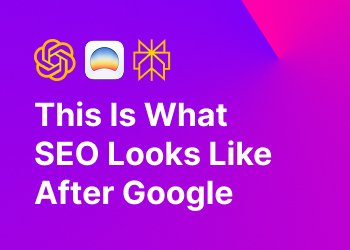SEO Strategies for the AI Era: Your Complete Guide


Artificial intelligence has fundamentally changed how search engines operate, how users find information, and how businesses must approach SEO. While some claim "SEO is dead," the reality is far more nuanced. SEO isn't disappearing—it's evolving into something more sophisticated, strategic, and focused on genuine value creation.
This comprehensive guide will show you exactly how to adapt your SEO strategies for the AI-driven future, helping you maintain visibility and drive meaningful results in an increasingly competitive landscape.
Understanding AI-Powered Search Algorithms
Modern search engines rely heavily on artificial intelligence to deliver relevant results. Google's RankBrain, introduced in 2015, was just the beginning. Today's algorithms use machine learning and natural language processing to understand search intent with remarkable accuracy.
Google's RankBrain and BERT: The Foundation of Modern Search
RankBrain processes search queries using machine learning, particularly for unfamiliar or complex queries. It doesn't just match keywords—it interprets the meaning behind searches and delivers results that best satisfy user intent.
BERT (Bidirectional Encoder Representations from Transformers) takes this further by understanding context and nuance in natural language. When someone searches for "how to catch a baseball," BERT understands they want information about physically catching a ball, not watching a baseball game.
These technologies represent a fundamental shift from keyword matching to intent understanding. For businesses, this means content must provide genuine value and answer real questions, not simply include target keywords.
The Shift from Keywords to Search Intent
Traditional SEO focused on keyword density and exact matches. AI-powered search prioritizes understanding what users actually want to accomplish. This shift requires a complete rethinking of content strategy.
Consider the difference between optimizing for "best coffee shop" versus understanding that users might actually want "locally roasted coffee near me with WiFi for working." The second approach addresses specific intent and creates more valuable content.
Search intent generally falls into four categories:
- Informational: Users seeking knowledge or answers
- Navigational: Users looking for specific websites or pages
- Commercial: Users researching products or services before purchasing
- Transactional: Users ready to make a purchase or take action
Understanding these intent types helps create content that aligns with what AI algorithms prioritize: satisfying user needs efficiently and comprehensively.
Adapting Content for AI-Driven Search
The explosion of AI-generated content has created both opportunities and challenges. While AI has lowered the barrier to content creation, it has also raised the quality threshold for ranking well.
Creating Original, Insightful Content
AI algorithms increasingly favor content that provides unique value—what experts call "information gain." This means your content must offer something that doesn't already exist elsewhere online.
Original research, proprietary data, and unique insights become your competitive advantage. Instead of rehashing existing information, focus on:
- Conducting original surveys or studies in your industry
- Analyzing trends using your company's internal data
- Sharing case studies from real client experiences
- Providing expert commentary on industry developments
- Creating comprehensive guides that combine multiple perspectives
For example, rather than writing another generic "social media marketing tips" article, you might analyze engagement data from 1,000 businesses to reveal which posting strategies drive the highest ROI.
The Rise of Proprietary Data as a Ranking Factor
Search engines and AI tools increasingly reference sources that provide original, data-driven insights. This "original data advantage" makes your content irreplaceable in AI-generated summaries and search results.
Companies that consistently produce original research often see their content cited across multiple sources, creating a compound effect for their SEO efforts. This approach requires more investment upfront but delivers long-term visibility benefits.
Leveraging Brand Mentions and Reputation
AI doesn't just count backlinks—it evaluates brand mentions and citations across the web. This "surround sound SEO" approach means your brand's reputation and visibility across multiple platforms directly impacts search performance.
Focus on building brand mentions through:
- Industry publications and trade magazines
- Podcast appearances and interviews
- Speaking engagements at conferences
- Collaboration with other businesses and influencers
- Community participation in relevant forums and discussions
Each mention strengthens your brand's authority and increases the likelihood that AI tools will reference your business when answering related queries.
AI-Powered Tools for SEO
The same AI technology transforming search engines is also revolutionizing SEO tools, making optimization more efficient and precise than ever before.
Content Optimization Tools
AI-powered content optimization tools analyze top-performing pages and provide specific recommendations for improving your content's relevance and readability. These tools can:
- Suggest relevant topics and subtopics to cover comprehensively
- Identify content gaps where you can provide additional value
- Recommend optimal content length based on competitor analysis
- Analyze readability scores and suggest improvements
- Evaluate semantic relationships between keywords and topics
Modern content optimization goes beyond keyword placement to consider topic coverage, user engagement signals, and content structure that AI algorithms favor.
Technical SEO Automation
AI tools can identify technical issues that might harm your search performance with remarkable accuracy. They can automatically detect:
- Broken links and redirect chains
- Page speed issues and optimization opportunities
- Mobile usability problems across different devices
- Crawl errors that prevent proper indexing
- Schema markup opportunities for rich snippets
These tools save hours of manual auditing while providing actionable recommendations for improvement.
Data-Driven Insights and Prediction
AI excels at analyzing large datasets to identify patterns and predict trends. For SEO, this means:
- Predicting which topics will gain popularity before competitors notice
- Identifying seasonal trends in search behavior
- Analyzing competitor strategies and finding opportunities
- Forecasting the impact of algorithm updates
- Personalizing content recommendations based on user behavior
These insights enable proactive rather than reactive SEO strategies, helping you stay ahead of the competition.
The Importance of User Experience in AI-Driven SEO
AI algorithms increasingly evaluate user experience signals when ranking content. These signals help search engines understand whether your content truly satisfies user needs.
Key User Experience Factors
Modern SEO requires optimizing for both search engines and human users. Key factors include:
- Page loading speed across all devices and connection types
- Mobile responsiveness and touch-friendly navigation
- Clear information architecture that helps users find what they need
- Engaging content formatting with headers, bullet points, and visuals
- Accessible design that works for users with disabilities
AI for Identifying User Experience Issues
AI-powered analytics tools can identify user experience problems by analyzing behavior patterns:
- High bounce rates on specific pages or sections
- Drop-off points in conversion funnels
- Navigation difficulties that frustrate users
- Content gaps where users exit without finding answers
- Performance issues that impact user satisfaction
By addressing these issues systematically, you improve both user satisfaction and search engine rankings.
The Future of SEO: AI as an Enhancement Tool
Rather than replacing traditional SEO, AI enhances and amplifies effective strategies while making ineffective tactics obsolete.
AI as Your SEO Multiplier
The most successful businesses use AI to scale their SEO efforts rather than replace human expertise. AI excels at:
- Processing large amounts of data to identify opportunities
- Automating repetitive tasks like reporting and monitoring
- Testing and optimizing content variations at scale
- Personalizing user experiences based on behavior patterns
- Predicting trends and algorithm changes
Human expertise remains essential for strategy, creativity, and understanding business context that AI cannot replicate.
Voice Search and Conversational Queries
The rise of voice assistants has changed how people search for information. Voice queries tend to be longer, more conversational, and question-based.
Optimizing for voice search requires:
- Focusing on long-tail keywords and natural language patterns
- Creating content that answers specific questions clearly and concisely
- Optimizing for local search since many voice queries are location-based
- Improving page speed and mobile experience for better voice search performance
- Using structured data to help AI understand your content context
The Evolution of Search Behavior
Users now search across multiple platforms—Google, YouTube, TikTok, LinkedIn, and others. This "search everywhere" behavior requires a comprehensive approach to visibility.
Your content strategy should address:
- Platform-specific optimization for different search engines
- Video content for YouTube and social media platforms
- Professional content for LinkedIn and industry-specific platforms
- Visual content for Pinterest and Instagram
- Community engagement on Reddit and niche forums
Embracing AI SEO
The integration of AI into SEO represents a fundamental shift toward quality, relevance, and user value. While the landscape has become more complex, it has also become more rewarding for businesses willing to invest in genuine value creation.
Success in the AI era requires combining technological tools with human insight, original thinking, and a deep understanding of your audience's needs. By focusing on information gain, building brand authority, and leveraging AI tools strategically, you can maintain and improve your search visibility.
The businesses that thrive will be those that view AI not as a threat to traditional SEO, but as an opportunity to create better, more valuable experiences for their users. Start by auditing your current approach, identifying areas where AI tools can enhance your efforts, and committing to producing original, high-quality content that serves your audience's genuine needs.
The future of SEO is bright for those ready to evolve with the technology. The question isn't whether AI will impact your search performance—it's whether you'll harness its power to amplify your success.
Tl;Dr
As AI reshapes how search engines understand and rank content, optimizing for both traditional search and AI-powered discovery requires a strategic approach that goes beyond keywords to deliver genuine value. Start your free trial today and let ezbot help you continuously optimize your website experience to convert the traffic your improved SEO brings in.







